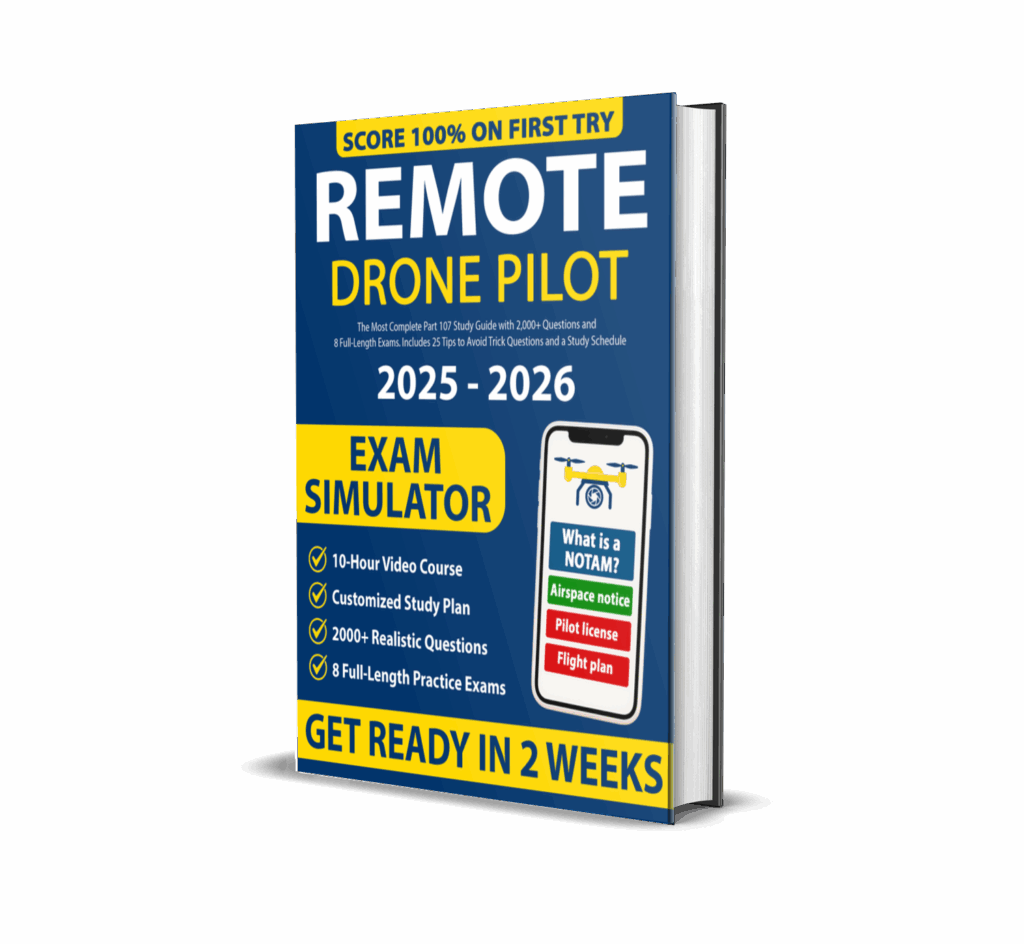
ARE YOU READY?
LET’S PRACTICE!
#1. What is the maximum altitude you can fly a small UAS under Part 107 regulations?
#2. When operating in Class C airspace, what must a remote pilot do prior to flight?
#3. Which of the following operations requires a waiver from the FAA?
#4. The load factor increases during a turn. What effect does this have on the aircraft?
#5. How long is a remote pilot certificate valid?
#6. Which is true regarding alcohol consumption and remote pilot operations?
#7. What is the minimum weather visibility required for sUAS operations?
#8. A NOTAM has been issued for your area. What should you do?
#9. What does ‘MSL’ stand for?
#10. You observe a fast-moving thunderstorm approaching. What should you do?
#11. Who is responsible for the safety of the sUAS during flight?
#12. What class of airspace is typically found at major airports?
#13. Which frequency is used for emergency communication?
#14. What is the minimum age to receive a Remote Pilot Certificate?
#15. Which document must be accessible during UAS operations?
#16. What type of weather briefing can be obtained online without contacting Flight Services?
#17. What does ‘sUAS’ stand for?
#18. When can a UAS operate from a moving vehicle?
#19. How far must you be from clouds when flying a UAS?
#20. You must report an accident to the FAA if it results in:
#21. What is the purpose of a sectional chart?
#22. What is the speed limit for UAS under Part 107?
#23. How often must you complete recurrent training?
#24. What defines ‘daylight’ under Part 107?
#25. What is Class G airspace?
#26. Which airspace requires ATC clearance?
#27. Which of the following is considered a hazardous operation?
#28. Which preflight action is required for all flights?
#29. What does ‘FPV’ stand for?
#30. What is the maximum weight of an sUAS under Part 107?
#31. What effect does high density altitude have on sUAS performance?
#32. If GPS fails during flight, what should you do?
#33. What is the minimum number of people required for UAS operation?
#34. Which operation requires a waiver?
#35. What is the maximum groundspeed allowed?
#36. A TAF provides forecast information for what duration?
#37. What hazard is associated with cumulus clouds?
#38. What should be your first action when experiencing UAS failure?
#39. Which weather condition provides the best visibility?
#40. Under Part 107, night operations require:
#41. How far must you keep from a tower when no waiver is granted?
#42. When may a remote pilot deviate from Part 107?
#43. What is one reason to conduct a site survey before flight?
#45. ‘SCT025’ on a METAR means:
#46. How do you recognize Class E airspace on a sectional chart?
#47. Which physiological factor can affect a remote pilot?
#48. What is the function of a visual observer (VO)?
#49. What should you do if you lose visual line of sight?
#50. Which factor is least likely to affect UAS performance?
#51. ‘KT’ in a METAR stands for:
#52. What is the key reason to maintain line of sight?
#53. What could result from flying under the influence?
#55. Which operation does not need FAA authorization?
#56. Who can request to see your Remote Pilot Certificate?
#57. An MOA (Military Operations Area) is:
#58. How does temperature affect battery life?
#59. What is the primary purpose of LAANC?
#60. Which UAS component is most sensitive to electromagnetic interference?


